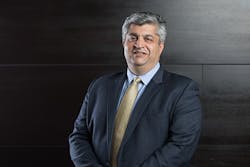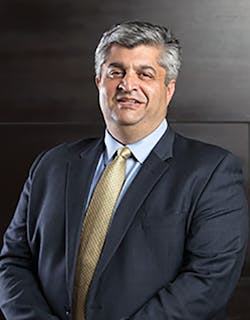MCAA President Kilijian Wants to Focus on Resources for Contractors
Editor’s note: Last year, we ran this interview, not knowing the catastrophic pandemic knocking at the door. The Mechanical Contractors Association of America canceled its week-long convention and decided to keep Brian Helm as president for another year.
MCAA explains: “The role of the MCAA president is largely that of an ambassador to the contractor members, the local MCA affiliates and the national events we hold. COVID-19 put many of these events on hold, so the Executive Committee thought it would be best if we extended the officer positions for another year. By extending the terms for another year, it gives Armand the opportunity to visit with our members and local affiliates to encourage them to get involved to better themselves and their companies.”
Here is our 2020 interview, updated with 2021 information on how the association is helping member businesses through the pandemic.
_______________________________
In February, at the Mechanical Contractors Association of America’s virtual education conference, the organization named Armand Kilijian as its president for 2021-2022.
Kilijian is the president of San Francisco-based O'Brien Mechanical, a family-owned, full-service plumbing/piping/HVAC contractor. The design-build firm self-performs a wide range of plumbing and piping installation work for commercial projects throughout the Greater San Francisco Bay Area.
His thirst for professional knowledge brought him to the Northern California MCA, where he held many leadership positions — including the offices of president, vice president and treasurer. Kilijian served on the organization’s board of directors, and was a member of the Budget and Nominating Committees. He co-chairs the Northern California MCA Local 38 Negotiating Committee and is a trustee of the UA Local 38 Trust Fund.
Attending his first MCAA convention inspired him to serve his fellow contractors on a national level. He went on to chair the Plumbing Contractors of America, an affiliate group of MCAA focused on union plumbing contractors. He also was a member of MCAA’s Education, Construction Technology, and Management Methods Committees. He was elected to the MCAA board of directors in 2012.
We spoke to Kilijian before the convention to discuss his passion for the industry, his hopes for MCAA — and his goal to make MCAA resources on fabrication and other construction technologies that result in increased productivity more accessible to the mechanical industry.
Contracting Business: How did you know you wanted to be part of this industry? How did you get your start?
Armand Kilijian: It’s all by chance. I didn’t drop into the family business or have friends or family in construction. I did know that I wanted to be part of a company that was local to the San Francisco Bay Area and in which I could make a difference.
After working at Johnson Controls, I had a good feeling about the industry. Through a colleague’s introduction, I was lucky enough to interview with and partner into O’Brien Mechanical. I’ve been here for more than 20 years and have enjoyed the journey immensely.
CB: What do you love about your job? What do you dislike about it?
AK: It’s great to look at a skyline in a city that you love and know that you made a difference in the shape, character and feel of it. The San Francisco Bay Area is a dynamic and vibrant region. I love that our company has had a part in painting that picture.
I think the least liked part of my job has to be the day-to-day grind that we sometimes fall into. Remembering why we come to work in the first place, and then keeping a long-term positive attitude is difficult but definitely helps keep me and my team motivated.
CB: What piece of advice helped you the most in your career?
AK: Communicate as soon as an issue comes up. We are all human, nothing is perfect, and what can go wrong sometimes does. I have learned that as long as everyone can be made aware of potential issues with time to think and plan, we as an industry will work through it without a lot of heartache. As an industry, we are natural problem-solvers. We just need to be given the time to be able to solve those problems.
CB: What are you most passionate about in the industry? How do you hope to work on this issue while MCAA president?
AK: There is so much information out there, and it seems that contractors do not have the time to learn about how the industry has moved forward to help them do their jobs better. Fabrication of duct, pipe and building systems is one example that, once implemented in a company’s culture, can reap yearly benefits. The fear or the challenge is taking that first bite of the apple.
‘Construction companies as an industry adapt to whatever issues or problems might occur in the field. The pandemic is just another one of those hurdles.’
CB: What’s the biggest problem facing mechanical contractors today?
AK: Keeping up with technology, the industry and the perceived expectations of building owners and general contractors, all while dealing with a pandemic. Quicker, more efficient and safer are the buzzwords that are permeating all aspects of our businesses.
‘Hiring and bringing qualified workers up to speed during these difficult times seems to be the mechanical contactor's biggest challenge.’
To meet those expectations, contractors need qualified labor, both in the office and in the field. Hiring and bringing those individuals up to speed during these difficult times seems to be the biggest challenge.
CB: As we continue to deal with the COVID-19 pandemic, what programs/services/advice are members looking to MCAA for?
AK: Members look to MCAA for information to get their businesses through the pandemic, from assistance understanding the evolving legislative and safety landscape to help with recovery of loss of labor productivity. At the same time, MCAA continues to deliver the top-quality education our members have come to expect through events like our Safety Directors’ and Technology conferences, our MSCA classes and our many webinars.
We also introduced some new things — including the first MCAA Virtual Education Conference, a Preparatory Institute for Project Management for those with little or no PM experience, and virtual versions of our National Education Initiative seminars.
CB: Are commercial contractors affected by the need to offer “no contact” sales calls during the pandemic? Are they using more digital invoicing, perhaps more video to showcase problem areas or finished work?
AK: Commercial contractors have certainly had to adapt their businesses for the pandemic. In many cases, that means quickly replacing legacy systems with alternatives that are more conducive to a virtual work environment and one of those areas has certainly been sales calls. Most are now done via videoconference.
In construction, we’re seeing more use of 360-degree video with tools such as OpenSpace and StructionSite that simplify the process of gathering and sharing this data. On the service side, tools like XOi let service technicians capture and share information using their cell phones’ cameras.
CB: What types of commercial training have become popular since the start of the pandemic?
AK: A variety of training is available, but most if not all is done virtually. As much as COVID-19 has caused our businesses to evolve, a building is still a building. We need training on how to properly install equipment in addition to the bigger picture and strategic issues.
MCAA has partnered with our Manufacturer Supplier Council members and is now offering a new resource: a section of our website dedicated to the training resources provided by our manufacturer members.
CB: Does MCAA have any thoughts on when mechanical contractors can get back to regular (in-person) practices?
AK: There is a lot of uncertainty in the world and in each of our markets. None of us can predict what the future holds. It may not look like it did before COVID-19. We’re fortunate that our workers are considered essential, so while there are fewer of them on a job at a time, the work has continued. Likewise, our office work has been able to continue remotely and in person wherever possible.
Construction companies as an industry adapt to whatever issues or problems might occur in the field. The pandemic is just another one of those hurdles. Looking back over the past year, through the assistance of great industry associations such as MCAA, I think we have come out stronger and have established a new regular or normal in our industry.
CB: MCAA puts a significant emphasis on technology. How are members navigating the technology landscape?
AK: MCAA has been at the forefront of researching what technology has to offer and then passing that information on to its members. Through its many offerings, MCAA members are introduced not only to the earth-shattering ideas and concepts that are being developed, but also to white papers on BIM programs, construction management software and even 3D imaging that a mechanical contractor can start utilizing within a few days.
The takeaway that a mechanical contractor can get from MCAA’s programs and utilize almost immediately is what MCAA does best.
CB: How can mechanical contractors and mechanical engineers collaborate better to ensure the best project outcomes?
AK: That is a great question. I don’t think that either side intentionally looks to call the other out. Buildings now demand better systems that take up less space. Our collaboration is really with the architects as they are the ones that dictate space and systems.
As the technology surrounding 3D building information modeling and systems becomes more and more integrated with design upfront instead of following building design, we are going to see a smoother design and construction process that will make all of our lives easier.
CB: What is MCAA doing to recruit more people into mechanical contracting and engineering? More veterans? More women?
AK: MCAA has 60 student chapters at colleges and universities across North America. Hundreds of our member companies hire college students as interns every year, many with financial grants from our foundation. MCAA facilitates that process with job fairs at our annual GreatFutures Forum, as well as networking and recruiting events at our annual convention. Our yearly student chapter competition is the most challenging and thought-provoking in construction.
Our labor partner, the United Association, established the VIP Program, an award-winning program that provides active-duty military members a career pathway in civilian life through the piping trades. And MCAA's Women in the Mechanical Industry program is empowering women to further enrich and enhance their careers through networking, education, mentoring and career development opportunities beyond those already offered through membership in MCAA.
CB: Are you optimistic about the future of mechanical contracting?
AK: Yes, of course. Physical buildings are still a necessity in our lives. It takes qualified, skilled labor and contractors to build those buildings. You might be able to buy your groceries online but first, you need contractors to construct the building that stores those groceries.
You might be able to buy your groceries online but first, you need contractors to construct the building that stores those groceries.
The same is true of the buildings we all work in and the places where we live. What we do and how we do it may be different, but mechanical contractors will still have to do something to help support the definition of what we call a building.
CB: If you only had one message to give to your fellow contractors, what would it be?
AK: Take the time to better yourself and your company in any way possible. Use the wealth of resources available to MCAA members as well as your peer resources throughout the year. Even one change will make a difference.
Kelly Faloon is a contributing writer to Contractor, Contracting Business and HPAC Engineering magazines, and principal of Faloon Editorial Services. The former editor of Plumbing & Mechanical magazine, she has more than 20 years' experience in the plumbing and heating industry and B2B publishing. Faloon is a journalism graduate of Michigan State University.
About the Author

Kelly L. Faloon
Freelance Writer/Editor
Kelly L. Faloon is a contributing editor and writer to Contracting Business magazine, Contractor and HPAC Engineering. The former editor of Plumbing & Mechanical magazine, Faloon has more than 20 years experience in the plumbing and heating industry. She started a freelance writing and editing business in 2017, where she has a varied clientele.
Faloon spent 3 1/2 years at Supply House Times before joining the Plumbing & Mechanical staff in 2001. Previously, she spent nearly 10 years at CCH/Wolters Kluwer, a publishing firm specializing in business and tax law, where she wore many hats — proofreader, writer/editor for a daily tax publication, and Internal Revenue Code editor.
A native of Michigan’s northern Lower Peninsula, Faloon is a journalism graduate of Michigan State University. You can reach her at [email protected].

